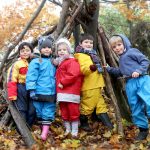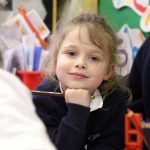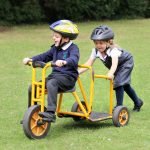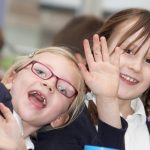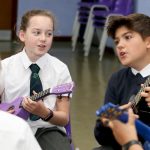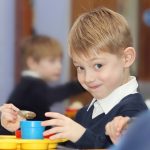Year 5 Newsletter – Autumn Term
Autumn Newsletter, Year 5
Welcome to Year 5! We hope you have enjoyed your holidays and, like us, are looking forward to a busy term in class. We outline below the curriculum areas to be covered this term as well as ways you can help us to support your child’s learning in Year 5.
English
In English this year, the whole school will be using a new scheme of work called The Literacy Tree which is a book led approach to English. These units will also cover a range of grammatical features. The first text we will be studying is a futuristic thriller called Robot Girl written by Malorie Blackman. As we read the book, the children will unpick the elements of science-fiction writing as they learn more about the key characters in the story, comparing them. They will explore creating effective dialogue to convey character and show feelings through writing emails in role. After making predictions about twists and turns in the story, they will go on to create atmospheric setting descriptions, give a character advice about what to do, and write an action scene. After finishing the book and discussing the dramatic plot twist, they will write a book review before going on to create their own science-fiction narrative inspired by Robot Girl.
We will then be moving onto Hidden Figures by Margot Lee Shetterly which is the previously untold story of four African-American women, all with exceptional maths skills, who helped America win the Space Race. In this unit, the children will be writing a range of texts such as job adverts, formal persuasive letters, diary entries, character descriptions and opinion pieces and the main outcome will be a non-chronological report about the achievements of the women and the history of NASA.
After half term, we will be studying ‘Beowulf’. This is an Anglo-Sazon legend retold by Michael Morpurgo and the children will get the opportunity to discuss legends and the importance of heroic poetry in early European literature. They will go on to create a number of varied written outcomes using the text as a starting point including recounts, dialogue, descriptions, obituaries and writing their own epic, heroic narrative using various poetic devices.
We will then finish the term by reading ‘Freedom Bird’ by Jerdine Nolen, which tells the story of John and Millicent Wheeler, whose parents were sold as enslaved people to work on a North Carolina Plantation. Before being sold, their parents told them stories of how one day their people would fly away to freedom; these are the hopes and dreams that remain alive in their hearts. The sequence of learning begins with children considering the difference between their needs and wants, before going on to research the history of the transatlantic slave trade in America. Children will create dialogue of a conversation between the two siblings and write them a letter of advice to help them through their situation. The final writing outcome will be a biography of Harriet Tubman, one of the most famous conductors on the Underground Railroad.
Maths
We will start this term by looking at place value in whole numbers with numbers up to 1,000,000. This will involve representing numbers in different variations as well as comparing, ordering and rounding numbers. We will also be studying decimals and interpreting negative numbers in context. We will also cover mental and written addition and subtraction methods, including using column addition/subtraction to add/subtract pairs of 4/5-digit numbers. The children will practise their times tables regularly and they will use mental multiplication and division. They will multiply/divide by 10, 100, 1000 and write decimal numbers as tenths and hundredths. In all these units, children will work on solving multi-step problems involving missing numbers as well as answering reasoning problems. They will also use estimation and the inverse operations to check answers to calculations and determine, in the context of a problem, an appropriate degree of accuracy.
History and Geography
Greece will be the focus of our learning this term, the geography of Greece and the importance of tourism today followed by the study of Ancient Greece and its influence on life today. We will explore the issue of where artefacts such as the Elgin Marbles should reside (a particularly pertinent debate after the recent theft of items from the British Museum) and will consider what artefacts can teach us about daily life in Ancient Greece.
Science
For the first half term we will learn about the properties of materials. The children will compare and group together everyday materials on the basis of their properties, including their hardness, transparency, and conductivity (electrical and thermal). They will give reasons, based on evidence from comparative and fair tests, for the particular uses of everyday materials. In the second half term, we will be learning about forces; discussing what gravity and resistance are and identifying the effects of friction and water resistance. The children will have lots of opportunities to work scientifically, planning different types of scientific enquiries to answer questions. They will take measurements, use a range of scientific equipment, record results and report and present their findings.
Art and DT
Our art during the autumn term will be inspired by Gustav Klimt’s Birchwoods paintings, developing the use of tonal colour in painting. We will be looking at identifying light sources and using shading and shadow consistently to reflect these. We will also be studying ancient Greek pottery and making simple pots, using sgraffito techniques to apply patterns.
In DT, we will be exploring the contents of our allotments to design and make ‘autumnal’ soups to inspire the kitchen staff!
Computing
We begin this term with coding, developing games, detecting errors in algorithms and adjusting variables when sequencing our programmes.
RE and PSHE
In RE, this term we will focus on different viewpoints on religion; what is meant by Atheist, Agnostic and Theist. Children will explore what a Christian belief is – and whether belief in God is reasonable – as well as what Humanists believe.
Our PSHE learning will lead us to think about physical contact and feeling safe. We will also be looking at family life and how to manage changes that might take place in a family setting.
Music
We will be following the Charanga music scheme, learning ‘Living on a Prayer’ and looking at singing and playing instruments with a focus on pulse, rhythm and pitch.
PE
PE will be taught on Wednesdays and Thursdays this term and the children will need to make sure they have full school PE kit on these days as well as for additional sporting clubs and events. We will begin the term with dodgeball and football.
French
Our key themes this term will be to describe family members and to know the names of items of clothing, describing them with a range of adjectives. We will focus on developing the children’s ability to understand increasingly complex sentences and to build sentences of their own, adding adjectives and remembering the importance of ensuring that adjectives reflect gender and number in French. We will supplement the weekly lesson with short, additional sessions practising verbal and listening skills; any additional practise that you are able to offer at home is extremely beneficial for building confidence and embedding vocabulary in any new foreign language so please do give this a try if you feel able – or try some Duolingo!
Homework and how you can support your child’s learning
How we are doing homework across the school is changing, more communication will be coming out soon and we will share more information with you at Meet the Teacher.
Reading continues to be important for your child’s development; please encourage your child to sample a wide range of text types and support their interest in reading by discussing what they have read and by continuing to share texts together when possible. Reading aloud has been shown to be hugely beneficial even as the children’s independent reading ability grows so please maintain this where you can and record this in their reading journals. They should read daily at home where possible, completing reading challenges regularly as they wish.
If you have any particular concerns or issues you would like to discuss regarding your child, please do not hesitate to contact us (please contact the office and they will arrange for one of us to call you).
Many thanks.
Miss Ullmann and Mrs Herd









